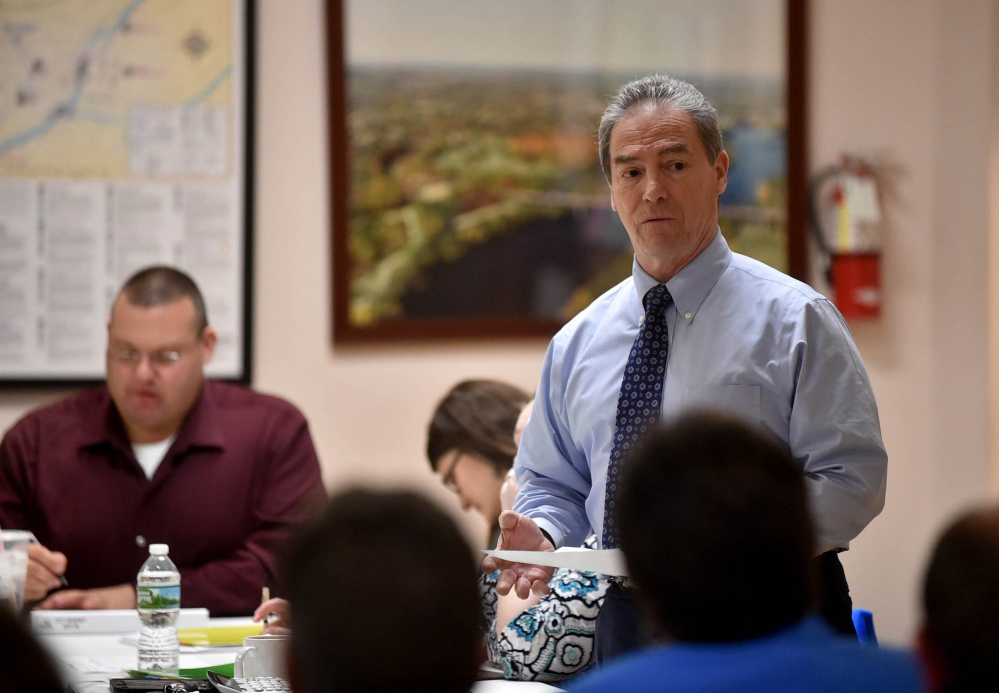More than a decade ago, Mike Roy, then Oakland’s town manager, was approached by Paul LePage. Roy, years earlier, had started in Fairfield as a code enforcement officer before moving on to Oakland.
LePage, then a city councilor, said to Roy, “Come work for me in Waterville” as the new city administrator. LePage had sought — some say engineered — the election that recalled Ruth Joseph, the last Democratic mayor to date.
LePage had his eye on the mayor’s chair, but didn’t want the “strong mayor” system that was provoking so much controversy. He told Roy that if he agreed to come to Waterville, he’d change the city charter to the manager-council system used by most Maine cities.
LePage was as good as his word. When Roy arrived, the city attorney told him the administrator was “nothing more than the mayor’s lackey,” but Roy soon became the first city manager. LePage “followed through on everything he promised,” Roy said during a recent interview at the historic city hall — a feature a 19th-century entrepreneur added to his plans for the Opera House upstairs.
It wasn’t always smooth going. LePage expressed his ideas, well, firmly. Along with rebuilding downtown, Roy had envisioned a riverside park at Head of Falls, the empty space created by federally funded “urban renewal” that brought major grants to Waterville in the 1960s while demolishing 300 buildings, including George Mitchell’s childhood home.
LePage dismissed the riverbank project; he just wanted to put in utilities along Front Street to create commercial building lots. Years after the mayor’s departure, the building sites are still vacant, but the city will soon embark on a “Riverwalk” project to bring residents and visitors back to the Kennebec River.
During Roy’s first year, he was approached by Paul Boghossian, a Colby College alumnus, about selling the vacant Hathaway shirt plant, city-owned, for $350,000. “Sure,” was Roy’s thought. Its successful transformation to the Hathaway Creative Center became the catalyst for a spectacular round of downtown redevelopment along Main Street.
Under President David Greene, Colby College has pledged more than $40 million in improvements, with the most visible evidence the new student dormitory, with offices and shops on the first floor, under construction that will patch a hole along Main Street. The gap was created — hard as it seems to believe today — to provide a better view of the mammoth Concourse parking lot that replaced much of the old downtown, with some 80 buildings removed.
The city has given the go-ahead to Colby’s projects, and those of several allied investors, and Roy calls it “the biggest thing to happen downtown since urban renewal — maybe bigger.” And it’s being done without wholesale demolition, although a few old buildings are coming down, replaced by new structures.
Some issues remain. A heralded return of two-way traffic to Main Street, an important “traffic calming” measure, remains pending before the City Council; it hasn’t generated as much public support, thus far, as Roy had hoped it would.
Still, the city’s renaissance has exceeded Roy’s expectations, who, unlike former Mayor LePage, has no plans to seek another job. But Roy can be an activist, too.
When the Rotary Club offered a $150,000 grant to celebrate its centennial, Roy wrote to suggest the Riverwalk project as worthy, and it was chosen. Rotary’s support, with other private gifts, leveraged public grants; construction of the $1.5 million project is expected this year.
The other project he’s proudest of is the Quarry Road Recreation Area, where a disused Colby ski slope has been transformed into a winter sports mecca, with nighttime cross-country skiing. It, too, was accomplished through a mixture of city cooperation and private fundraising.
Though Waterville no longer has a “strong mayor” system, Roy has served with several mayors who demonstrated the “force of their personalities,” including Karen Heck, a Democrat-turned-independent, and incumbent Republican Nick Isgro, who’s now considering running for governor to replace LePage.
When Roy is asked about the current governor, he chooses words carefully. LePage “left me alone to do my job,” he said. “When he got to Augusta, though, it became an us-versus-them dynamic. There was no compromise.”
As mayor, LePage was “much more collegial.” Roy finds it difficult to square the mayor he knew and the governor LePage became: “After he left here, it was more of a war.”
Roy enjoys working with the City Council, and appreciates that political party traditions in Waterville remain vibrant. As long as the boundaries are respected, he sees the contentions of politics still leading to good results for the city that launched Ed Muskie, George Mitchell — and Paul LePage.
Douglas Rooks has been a Maine editor, opinion writer and author for 33 years. He lives in West Gardiner, and welcomes comment at: drooks@tds.net
Send questions/comments to the editors.


